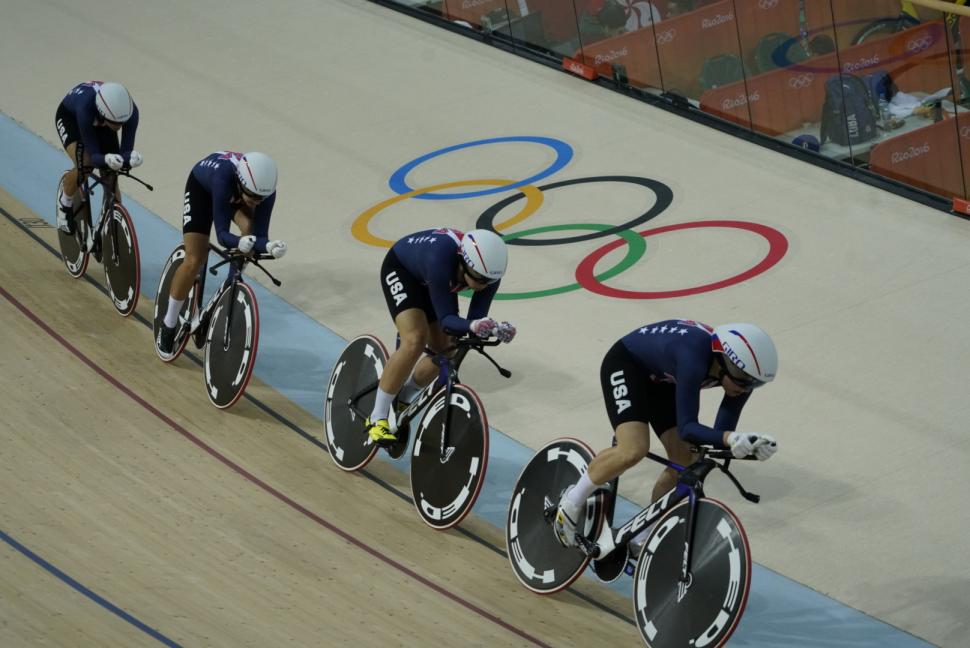- News
- Reviews
- Bikes
- Accessories
- Accessories - misc
- Computer mounts
- Bags
- Bar ends
- Bike bags & cases
- Bottle cages
- Bottles
- Cameras
- Car racks
- Child seats
- Computers
- Glasses
- GPS units
- Helmets
- Lights - front
- Lights - rear
- Lights - sets
- Locks
- Mirrors
- Mudguards
- Racks
- Pumps & CO2 inflators
- Puncture kits
- Reflectives
- Smart watches
- Stands and racks
- Trailers
- Clothing
- Components
- Bar tape & grips
- Bottom brackets
- Brake & gear cables
- Brake & STI levers
- Brake pads & spares
- Brakes
- Cassettes & freewheels
- Chains
- Chainsets & chainrings
- Derailleurs - front
- Derailleurs - rear
- Forks
- Gear levers & shifters
- Groupsets
- Handlebars & extensions
- Headsets
- Hubs
- Inner tubes
- Pedals
- Quick releases & skewers
- Saddles
- Seatposts
- Stems
- Wheels
- Tyres
- Health, fitness and nutrition
- Tools and workshop
- Miscellaneous
- Tubeless valves
- Buyers Guides
- Features
- Forum
- Recommends
- Podcast
news
 Kelly Catlin heads USA team pursuit squad at Rio 2016 (licensed CC BY SA 4.0 by Colin333)
Kelly Catlin heads USA team pursuit squad at Rio 2016 (licensed CC BY SA 4.0 by Colin333)Family of track cyclist Kelly Catlin donates her brain for research into concussion
The family of three-time world champion track cyclist Kelly Catlin have donated her brain to medical researchers to try and establish whether concussion was a factor in her decision to take her own life last week.
The 23-year-old’s brain has been given to Boston University's Chronic Traumatic Encephalopathy (CTE) Center, reports the Denver Post, which adds that clinical and pathological research could take up to 12 months to complete.
Her father Mark Catlin said: “Our family decided to have a neuropathologic examination performed on Kelly’s brain to investigate any possible damage caused by her recent head injury and seek explanations for recent neurologic symptoms.”
The CTE Center, which has a ‘brain bank’ comprising more than 600 brains, says it is “the largest tissue repository in the world focused on traumatic brain injury,” with brains of deceased athletes “examined neuropathologically for evidence of CTE or other disorders of the central nervous system.”
Catlin was found dead in her room at Stanford University in California last Thursday. She had recently written of her struggles to balance her postgraduate studies with her successful career in cycling, which saw her help the USA win three team pursuit world titles from 2016-18 as well as Olympic silver in Rio three years ago.
> Three-time world champion Kelly Catlin dies aged 23
Since her death, members of her family have said that they became concerned about changes in her personality since she sustained concussion in a crash in December, and have revealed that she attempted suicide for the first time in January.
Retired pathologist Mr Catlin said: “She was not the Kelly that we knew. She spoke like a robot. We could get her to talk, but we wondered, ‘what has happened to our Kelly?'
“Everything was open to her, but somehow her thinking was changed and she couldn’t see beyond, I guess, her depression.
“After her concussion, she started embracing nihilism. Life was meaningless. There was no purpose. This was a person with depression.
“For her, she could no longer concentrate on her studies or train as hard. She couldn’t fulfill what she felt were her obligations to herself, she couldn’t live up to her own standards.
“She couldn’t realise that what she needed to do was get away and rest, heal. We were all searching for the magic words, that life was worth living,” he added.
Anyone feeling emotionally distressed or suicidal can call Samaritans for help on 116 123 or email jo [at] samaritans.org in the UK. In the US, call the Samaritans branch in your area or 1 (800) 273-TALK.
Simon joined road.cc as news editor in 2009 and is now the site’s community editor, acting as a link between the team producing the content and our readers. A law and languages graduate, published translator and former retail analyst, he has reported on issues as diverse as cycling-related court cases, anti-doping investigations, the latest developments in the bike industry and the sport’s biggest races. Now back in London full-time after 15 years living in Oxford and Cambridge, he loves cycling along the Thames but misses having his former riding buddy, Elodie the miniature schnauzer, in the basket in front of him.
Tiz what it is…
Terrible story and genuine sympathy for the lady, and I realise this could easily look like victim blaming, but I'm 6 foot tall, male and built...
I really wasn't convinced by the inferences in this particular study. I'm certainly convinced by others, but this one seems to miss the most...
Lost his licence for dui, again?...
Welcome to Car Crashes into Building.
You need to watch cyclocross. Maximum 1 hour of racing. Awesome edge of the seat stuff (especially when MVP isn't riding).
Cases of hung, drawn and caught? Or if not in favour of the rules, hung, drawn and court erred?
I think that's fair. Just noting that as you've written that you can see that it's incredibly hard to get away from any narrative of "we need at...
Norwich cycling said it doesn't cut through and uses an exsiting path parallel with the allotment border....
The quote from her mother is so sad. No family should have to go through that.